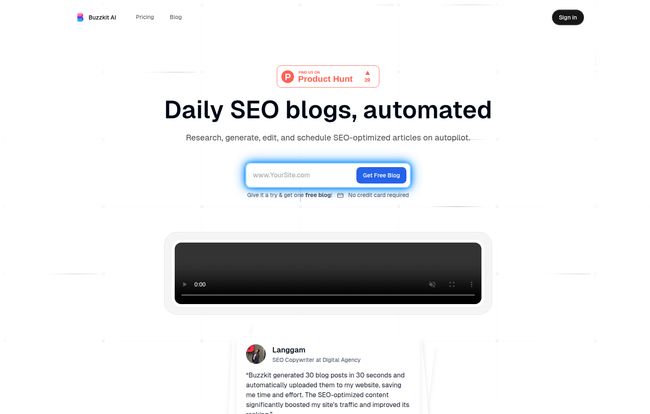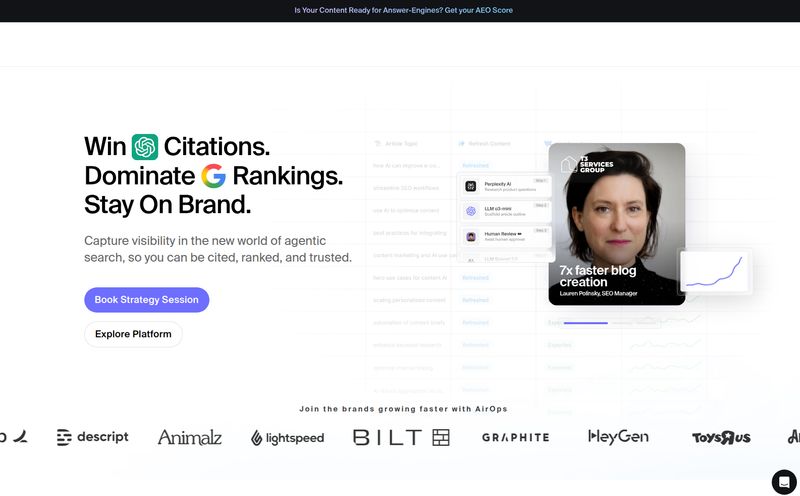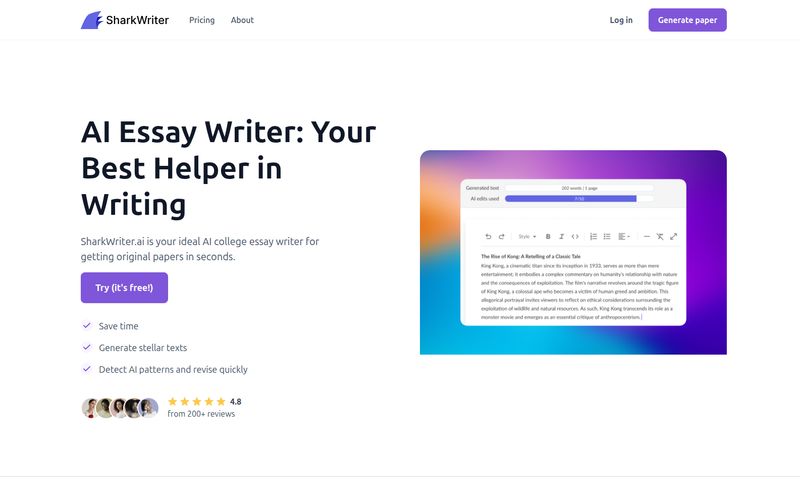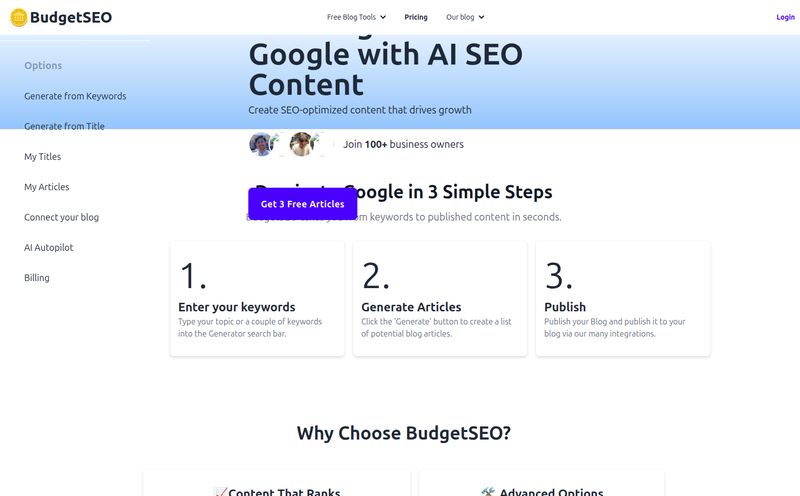As an SEO, my relationship with content is… complicated. I love it. I live for that perfect blog post that climbs the SERPs and brings in a steady stream of traffic. But I also, sometimes, kinda hate it. The sheer volume required to stay competitive these days can be a soul-crushing grind. The endless content calendars, the keyword spreadsheets, the creative block that hits right when a deadline is looming. We’ve all been there.
For years, the industry has been buzzing about AI content writers. And honestly? I've been skeptical. Most of them felt like glorified sentence spinners, churning out robotic, soulless text that a human would have to spend hours rewriting anyway. It felt like trading one problem for another. But then I stumbled upon tools that promised something more. Not just writing, but automation. A platform that could handle the strategy, the creation, and even the publishing. That’s what led me to Buzzkit AI.
The claim on their homepage is bold: “Daily SEO blogs, automated.” They say you can get 30 days of articles in seconds. My first thought? Yeah, right. But my curiosity got the better of me. So, I signed up, kicked the tires, and decided to see if this thing could actually hold up to the scrutiny of a cynical, coffee-fueled SEO veteran. Here’s what I found.
So What Exactly is Buzzkit AI?
At its core, Buzzkit AI is an SEO content automation platform. But that description feels a bit flat. It’s more like an automated content department in a box. The whole idea isn't just to write a single article for you. It's designed to take a handful of your target keywords and build out an entire content schedule, write the articles, find images, and then—this is the cool part—automatically post them to your website. It's trying to eliminate the grunt work, the copy-pasting, the scheduling… all the little things that eat up so much time.
It's an ambitious goal. The platform is basically promising to be your content strategist, your junior writer, and your virtual assistant all at once. For a small business owner or a solo marketer, that's a pretty tempting proposition.

Visit Buzzkit AI
A Closer Look at The Features That Matter
A tool is only as good as its features, right? Buzzkit AI has a bunch, but a few really stood out to me as being genuinely useful for anyone serious about traffic generation.
Bulk Blog Generation That Actually Works
This is the headline feature, and for good reason. I’ve spent countless hours mapping out content pillars and brainstorming dozens of blog topics. It's necessary but tedious work. Buzzkit’s approach is to let you feed it your core topics or keywords, and it just… goes. It generates a whole list of SEO-optimized titles and then writes the full articles. It felt a bit like magic the first time I tried it. Of course, the quality varies (more on that later), but the ability to generate a month's worth of first drafts in the time it takes to make a cup of tea is pretty wild.
Juggling Multiple Sites Like a Pro
If you're an agency or an affiliate marketer with a portfolio of niche sites, you know the pain. Logging in and out of different WordPress dashboards, keeping track of multiple content schedules—it’s a logistical nightmare. Buzzkit allows you to manage multiple businesses and domains from a single dashboard. For me, this is a huge quality-of-life improvement. Centralizing the content creation and publishing process across different projects could save a marketing agency dozens of hours every month. It turns chaos into a streamlined workflow.
The Built-In SEO Keyword Tools
I'll be honest, I didn’t expect much here. I live inside Ahrefs and Semrush, and I figured any built-in tool would be a cheap imitation. I was pleasantly surprised. While it’s not going to replace my primary research tools, the SEO Keyword Search and Analysis feature is solid. It's great for quick-and-dirty research and for finding long-tail keywords related to your main topics. The “Global Keyword Explorer” is also a nice touch, especially if you're targeting markets outside of the US. It's more than enough to build a foundational content strategy directly within the platform, which is all about efficiency.
Connecting the Dots with Integrated Analytics
Here’s something many content tools miss: closing the feedback loop. You publish content, but then what? How do you know if it's working? Buzzkit integrates directly with Google Search Console. This means it can pull in your actual performance data—clicks, impressions, average position—and display it right in the dashboard. Seeing which posts are performing well can help you double down on what’s working and inform the AI on what kind of content to generate next. It's a simple, but brilliant, addition.
The Elephant in the Room: Can AI Write Good SEO Content?
Okay, let's get to the big question. The one that keeps content writers up at night. Is the content any good? The answer is a classic SEO response: it depends.
I think of Buzzkit AI as the world’s best junior copywriter. It’s fast, it’s eager, it understands instructions (keywords, structure), and it never gets tired. It can produce a perfectly structured, grammatically correct, SEO-friendly B- or B+ article. It will include headings, lists, and relevant information. For certain types of content—like basic informational posts or definitions—it’s fantastic right out of the box.
But it's not a human. It can't (yet) replicate a strong, unique voice. It won't share a personal anecdote that builds a deep connection with the reader. It won't have a controversial hot take based on years of experience. That’s where you come in. The best way to use a tool like this is as a first-draft machine. Let it do 80% of the work—the research, the structuring, the basic writing. Then, you spend 20% of the time injecting your personality, adding real-world examples, and fact-checking the details. It's a partnership.
Some people might argue that relying on AI is a shortcut that cheapens content. But I see it differently. It’s a tool that frees up your most valuable resource: your strategic brain. Instead of spending 5 hours writing a basic post from scratch, you spend one hour elevating an AI draft into an A+ piece. That’s a win in my book. And let’s not forget the multilingual content creation feature. For businesses looking to expand internationally, this is an absolute game-changer, making market entry so much faster.
Lets Talk Money: Buzzkit AI Pricing Breakdown
Alright, no tool is perfect, and one of the first hurdles for many will be the price. Let’s break it down, because it's not a one-size-fits-all situation.
| Plan | Price | Best For | Key Limits |
|---|---|---|---|
| Basic | $29 /mo | Solo bloggers & small projects | 30 posts/mo, 1 website |
| Pro | $129 /mo | Growing businesses & content teams | 150 posts/mo, 5 websites |
| Business | $479 /mo | Agencies & high-volume sites | 1,000 posts/mo, 50 websites |
| Enterprise | Contact Us | Large organizations | Unlimited everything, premium support |
My take? The $29 Basic plan is a fantastic entry point. For a solo creator or someone testing out a new niche, 30 blog posts a month is more than enough to establish a content velocity. The $129 Pro plan feels like the sweet spot for most serious businesses or small agencies. The jump to 150 posts and 5 websites makes it a real workhorse. The Business and Enterprise tiers are clearly aimed at large-scale operations that are churning out content like there’s no tomorrow. The price may seem steep, but if you calculate the cost of a human writer for that volume, it starts to look very, very reasonable.
My Final Verdict on Buzzkit AI
So, am I a convert? Mostly, yes. Buzzkit AI isn't going to put talented SEOs and content strategists out of a job. What it will do is change the nature of that job. It’s a powerful force multiplier. It automates the most time-consuming, repetitive parts of content creation, allowing you to focus on high-level strategy, creativity, and promotion.
It’s perfect for scaling content on a network of sites, for filling out your content calendar with foundational posts, and for breaking through writer's block. It's less perfect for writing your flagship, thought-leadership pillar page. You still need a human for that. And that’s okay. It's about using the right tool for the right job. For the sheer purpose of automating daily SEO blogs and saving a ton of time, Buzzkit AI gets a solid nod from me.
Frequently Asked Questions about Buzzkit AI
- Can Buzzkit AI completely replace my content team?
- No, and it shouldn't. Think of it as a tool to augment your team. It handles the bulk of the initial drafting, freeing up your human writers to focus on editing, adding unique insights, and creating high-impact content that AI can't replicate.
- Is the content generated by Buzzkit AI original?
- The content is generated by an AI model trained on a massive dataset, so it creates statistically unique combinations of text. It's not copying and pasting from other sources. However, as with any AI tool, it's always a good practice to run a quick plagiarism check and, more importantly, to add your own unique perspective to make the content truly original.
- Does Google penalize AI-generated content?
- This is a big topic! Google's official stance, as of their latest updates, is that they reward high-quality, helpful content, regardless of how it's produced. They are against using AI solely to manipulate search rankings with low-quality spam. If you use Buzzkit AI as a tool to create genuinely helpful, well-edited articles, you are aligning with Google's guidelines.
- How difficult is Buzzkit AI to set up and use?
- It's surprisingly easy. The platform is designed with a clean user interface. The process generally involves connecting your website (like a WordPress site), inputting your topics or keywords, and letting the system do its work. There isn't a steep learning curve.
- Can I edit the articles before they are posted?
- Absolutly. In fact, that's the recommended workflow. You can review all the generated drafts within the Buzzkit AI platform, make your edits, add your personal touch, and then schedule them for automatic posting. You have full control over the final product.
Conclusion
The world of SEO is constantly changing, and AI is the biggest shift we've seen in a decade. Ignoring it is not an option. Tools like Buzzkit AI are not a threat; they're an opportunity. An opportunity to be more efficient, to scale faster, and to get out of the content hamster wheel. It won't write your masterpiece for you, but it will build the entire stage, set up the lighting, and hand you the microphone. The rest is up to you.



